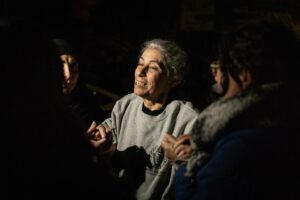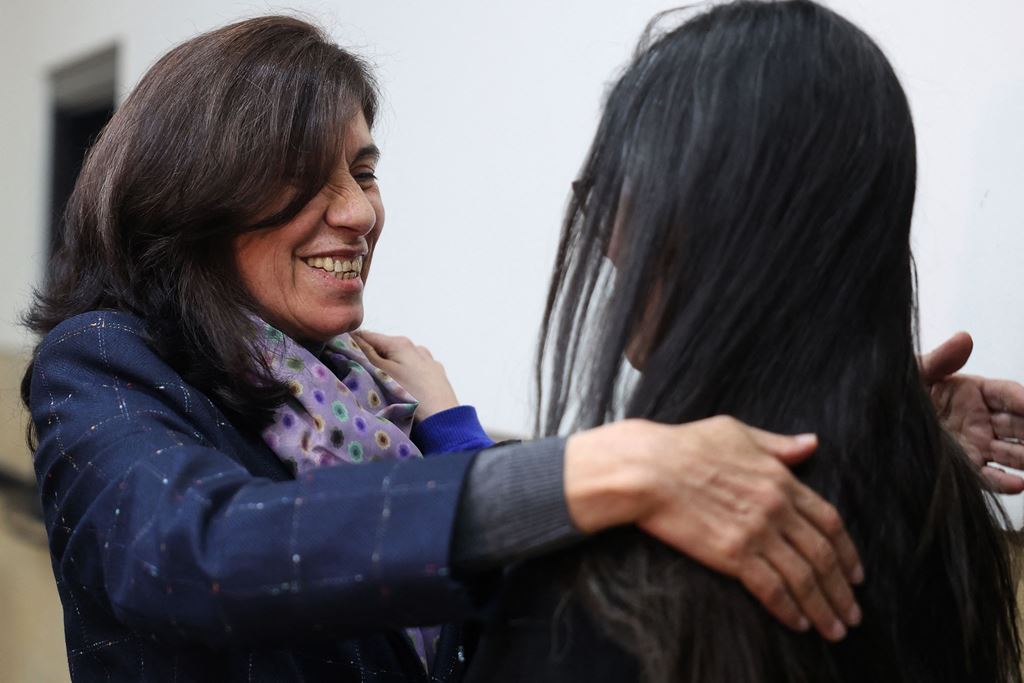RAMALLAH, Palestinian Territories (AFP) – What struck those who knew Khalida Jarrar when she exited the bus with 77 other Palestinians released from Israeli jails was the whiteness of her hair and her broken voice.
Jarrar, an activist of the Popular Front for the Liberation of Palestine (PFLP), said she lost her voice from six months in solitary confinement and accused Israeli jails of “bad treatment”, which the Israeli Prison Service denies.
She was released on Sunday in the first batch of Palestinian prisoners to be exchanged for hostages held in Gaza under a ceasefire deal between Hamas and Israel.
The ceasefire, which began on Sunday, came after more than 15 months of devastating war in Gaza.

The PFLP, which she represents in the Palestinian parliament that hasn’t convened since 2018, is a leftist movement blacklisted as a “terrorist organisation” by the European Union and the United States.
On her arrival in Ramallah, relatives were shocked to find her pale-faced and wearing a dazed expression.
“It was the first time I was speaking to a human being after six months of isolation in my cell,” she told AFP the next day, her hair dyed black.
Jarrar also heads Addameer, a human rights group that advocates for Palestinian prisoners in Israeli jails. She has been repeatedly placed under administrative detention by Israel, a controversial measure that allows indefinite detention without charge.
Her last stint in detention was in December 2023, following another 20 months in jail between 2018 and 2019, each time on grounds of “threatening the security of the state”.
She also served two years in prison between 2019 and 2021, forcing her to miss the funeral of her daughter Suha, who died suddenly at the age of 31.

In 2015, a military court charged her with 15 counts, including giving interviews, speeches and lectures, participating in marches and calling for the release of Palestinian prisoners.
“Conditions (in jail) have never been as harsh as they are today,” she said, citing “frequent attacks”, “regular tear gas spraying” and “insufficient and poor-quality food rations”.
She also condemned the “policy of isolation practised by the occupation authorities”.
Palestinian detainees in Israeli prisons are “treated as though they are not human beings”, she alleged, adding that the prisoner issue is “a Palestinian national cause”.
The Israel Prison Service denied the allegations.
“We are unaware of these claims. According to our information, no such incidents have occurred in prisons under our responsibility,” it said.
“Detainees have the right to file a complaint, which will be thoroughly investigated.”
The day after her liberation, dozens of sympathisers visited Jarrar to congratulate her.
Standing next to her was Abla Saadat, wife of PFLP general secretary Ahmad Saadat. She too was released in the exchange, after being interned without charge since September 2023.
Her husband has been in jail since 2002 on charges of ordering the previous year’s assassination of far-right Israeli tourism minister Rehavam Zeevi. He has been held by Israel since 2006.
Abla Saadat fears she too will swiftly return to prison. She said that on the day of her release, she received a decision to renew her administrative detention for another six months.
“The accusation against me is disrupting state security, without me knowing how,” she said.
Prisons “have become cemeteries where prisoners feel suffocated,” said Saadat, a leader in the Union of Palestinian Women’s Committees, which Israel has designated a “terrorist organisation”.
Since the October 2023 Gaza war, human rights groups including Israel’s B’Tselem have reported worsening detention conditions for Palestinians, including “systematic mistreatment” and “torture”.
Like Jarrar, Abla Saadat has been imprisoned more than once. But her latest detention “was the hardest,” she said. “I am detained every time simply because I am Ahmed Saadat’s wife.”




